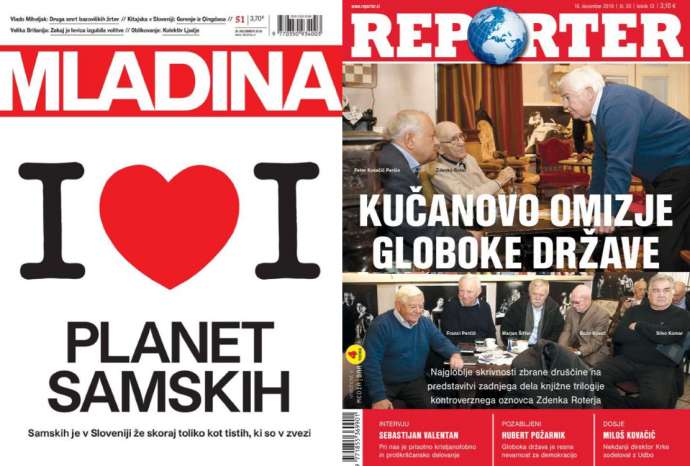The covers and editorials from leading weeklies of the Left and Right for the work-week ending Friday, 20 December
Mladina: Chinese-owned Gorenje seen as threat by Germany
STA, 20 December - The left-wing weekly Mladina is concerned about whether the Slovenian government is aware of the geostrategic interests involved in Gorenje becoming a Chinese company, predicting that Germany will make an all-out effort to prevent Hisense from making a foray into the European market through Slovenia.
In the latest editorial, headlined Angela Merkel Watching Gorenje, editor-in-chief Grega Repovž writes that Hisense has been unsuccessfully trying to get into the German market for almost two decades as all its attempts have been blocked by Germany and its industry, in particular the Bosch - Siemens group.
He says that this complicates the situation for the Slovenian household appliance company, because the moment it was acquired by Hisense, Gorenje became the company that the European industry and countries, in particular Germany, will do everything to stop in its expansion efforts.
"This is a big game that is not necessarily bad. Wise countries, especially small ones play at several sides, cooperate with various global superpowers thus establishing its power internationally.
"The German government does not feel any true sympathy for Slovenia, we are part of its interest but not its friends. To them, Hisense Slovenija is in fact a more important player than Slovenia," writes Repovž.
He goes on to say that China cares equally little about Slovenia, except when its geostrategic interests are concerned, wondering whether the Chinese government is extorting Slovenia over Gorenje into adopting Huawei's 5G technology, which he infers from Chinese Foreign Minister Wang Yi's visit.
He wonders whether the Slovenian government and intelligence services think ahead far enough, including how Slovenia's position in the eyes of the German government has changed and what will the consequences be for Gorenje.
"It is intriguing that Slovenia is getting involved in these big geostrategic games, but the fundamental question is whether it is fit to play. We are a country without long-term alliances, we do not have an ally of our own like the Croatians, who have Germany, or the Serbs France (and Russia)."
Repovž also notes the geostrategic interests related to retailer Mercator, where it says Slovenia has become vulnerable against Russia, which controls Mercator.
Or Ljubljana airport, where Lufthansa, one of the shareholders of the German operator of the airport, has now taken over most of the air traffic to and from Slovenia. "There was no coincidence in Adria Airways's collapse, only a clear business plan on the part of the competition."
Reporter: Poor governance at state-owned companies
STA, 16 December 2019 - The right-wing weekly Reporter writes about corporate governance at Slovenian state-owned companies in the latest editorial, finding that the executives affiliated with former President Milan Kučan are on their way out.
"Members of Kučan's table on the front page of the latest issue of Reporter (...) are the part of the deep state that is on its way out, their businesses are being taken by a new guard, rift apart into several networks that fight each other ruthlessly for control of the (para)state sector," writes editor-in-chief Silvester Šurla.
He writes that, 20 years ago, three close "adjutants of Kučan ruled" in the energy company Petrol, which "has always been and will continue to be a political company, as long as the state has a major say there. A big sack of money that many of the chosen ones feed from (...)
"Two months ago Petrol saw a showdown between 'red' networks, the losing side being the Borut Jamnik clan, an important member of which was Tomaž Berločnik, who rose to the post [of Petrol CEO] eight years ago with the help of politics and will now likely leave the same way."
Šurla offers Petrol as well as retailer Mercator and household appliances maker Gorenje as examples of how deep in the doldrums Slovenian corporate governance at state-owned companies is.
He says that Mercator and Gorenje were driven to such a poor state by domestic owners and managers that they are now being salvaged by foreigners.
"These days it is priceless to hear and watch how representatives of Russian Sberbank and Chinese Hisense are trying to drive home to the Slovenian public that socialism is over."
Šurla goes on to say that a person from China, the cradle of Communism, had to come to Velenje to spell it out that socialism is over once and for all, that there will be no future for Gorenje without a profit.
Under the headline Thin Red Line, the editor concludes that Mercator and Gorenje are "paying the toll of the notorious 'national interest'. Other 'flagship' state-owned companies are bound to face a similar fate in the future. Once they have turned into a heap of rust and politics is forced to sell them."
All our posts in this series are here







